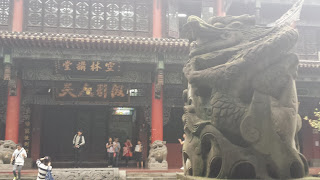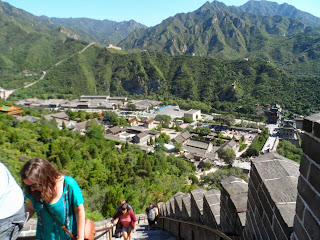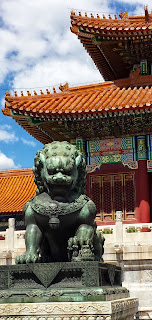Location: Arts and Sciences College of Sichuan Normal University
Population: 35,000 students
读万卷书不如行万里路 [讀萬卷書不如行萬里路]
(Dú wàn juǎn shū bùrú xíng wànlǐ lù.)
'Reading ten thousand books is not as useful as travelling ten thousand miles.'
(A pound of practice is more worth than an ounce of theory.)
Chinese Proverb
After
two weeks of compulsory military training and the end of the National
Holiday, my freshmen students finally begin classes with
me. For the most part they have regular English
names: Clare, Lucy, Emily, Sean, Derek, Pansy, Summer. Then
you get the odd curve ball- DingDing and DongDong, Sherlock,
Cinderella. Julius Caesar.
With
their unbounded enthusiasm they make my bubbly second years seem like
jaded old men. They want to know everything about my life, they take
photos with me to show their grandparents, and they constantly
attempt to feed me. In the space of two lessons I end up with a
snickers bar, two preserved eggs and a plum lollipop. Their
imagination needs only a little coaxing to produce work that is
creative and interesting- given the task to design an extreme
restaurant, my students choose to build their establishments by the
seaside, up a tree, in a volcano and in one case, on the moon.
I should have guessed from the number of KTVs in China that my students would like dancing and singing. It's difficult to walk around campus
without strolling past a group of students practising some routine to
the tinny music coming from a set of portable speakers on a bench. I
give a lesson on solving problems through music where they have to
create their own band, coming up with stage names, album titles,
logos and a back story etc. I tell them, half-jokingly, that if they
sing during their presentation I'll give them extra points. Of
course, I only have myself to blame when a group of students choose
to perform You Raise Me Up, Westlife accompanying them in the
background thanks to someone's iPhone and the rest of the class
swaying in unison. In an attempt to regain some sense of normality I
ask the next group of students to come up.
Student
A, striking a jazz hands pose: 'We are the Happy Monkey Band'
Student
B, nodding seriously: 'And we are from Earth.'
My
students aren't the only ones who enjoy the novelty of the new. This
week G and I finally gain water, light bulbs, gas for our portable stove, bank
accounts and are no longer considered illegal immigrants as we are
registered with the police at last. At last we are able to cook our own food in the apartment, turn on a light when it gets dark and drink water without having to boil it first. We celebrate being bought into the 21st century with comfort food from home: sausage, mash and beans on toast and for dessert a whole row from the block of emergency chocolate.
We also begin our weekly two hour
Mandarin lesson on a Wednesday where our Chinese teacher, Anna,
valiantly attempts to teach us and I try to understand what is going
on. Some words stick and others are lost immediately in the void. I
do, however, discover my favourite word in Mandarin:
红绿灯
Hónglǜdēng. It
means traffic light.

The
week ends with the Freshers Welcome Concert on Friday evening, which
opens with that most traditional of Chinese entertainment- River
dance. What then follows is a jumble of dance acts, literature
readings and celebrities. There's the group of dancing
septuagenarians, whose choreographer reveals she is 72. There's break
dancing, the appearance of a famous Chinese actor who for some
inexplicable reason decides to do the robot, a poem so distorted by
the sound-system it could be being read by Daleks, the appearance of
the Chinese version of Justin Bieber, the school song, the national
anthem, and, of course, the obligatory firework display, which is so
loud it makes the nearby apartment lights turn off and on.
Standing next to a group of students clad in plastic rain macs and waving neon batons, I can't help but conclude that it's certainly very different to my own Freshers University experience. I ask one of the students standing beside me, who's volunteered to translate what's happening, whether they are enjoying the concert or not.
He shrugs. 'It is better than morning exercise.'
I take that as tacit approval.















































